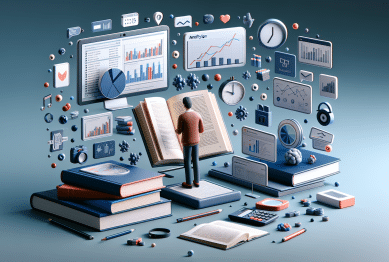Unlock the potential of lifelong learning with this in-depth look at how continued education impacts careers, wellbeing, and society. Explore how upskilling, digital literacy, and flexible programs make a difference for people of all ages in adapting to change.
The Foundations of Lifelong Learning
Lifelong learning is more than a buzzword. It describes a mindset and habit of continually expanding knowledge and sharpening skills, regardless of age or formal qualifications. As economies shift and technology advances, the need for ongoing education becomes undeniable. Today, many organizations and governments recognize that upskilling and reskilling the workforce is vital for staying competitive and innovative, especially as workplace expectations evolve. The concept has grown beyond traditional academic settings and now includes online courses, workshops, mentoring, and self-guided study, making it widely accessible. Lifelong learning nurtures curiosity, adaptability, and critical thinking—qualities in high demand for both personal and professional growth. Embracing lifelong learning prepares individuals to meet the demands of a rapidly changing society and fosters active participation in civic life (Source: https://www.oecd.org/education/skills-beyond-school/lllearning.htm).
One key driver of lifelong learning is the recognition that a single qualification is less likely to sustain a person throughout their entire career. Traditional degree programs provide a foundation, but ongoing learning ensures adaptability and relevance. For example, as automation changes the nature of work, acquiring new digital skills has become a cornerstone for career longevity. The rise of micro-credentials and stackable certificates reflects this shift, enabling tailored, flexible opportunities to build competencies as industry needs develop. Furthermore, lifelong learning cultivates intellectual curiosity and builds social capital by connecting learners with diverse networks and perspectives, encouraging the sharing of experiences and ideas across generations.
Lifelong learning is not just about job skills. It also enriches lives outside the workplace. People report improved wellbeing, greater confidence, and a deeper engagement with their communities when they continue learning throughout adulthood. From language acquisition and financial literacy to hands-on workshops in arts and crafts, the benefits go far beyond career advancement. By removing barriers such as rigid timetables or prohibitive costs, modern lifelong learning initiatives empower individuals to make choices that fit their circumstances, preferences, and goals. Whether the motivation is passion, necessity, or both, lifelong learning opens up endless pathways for self-discovery and personal achievement.
Why Upskilling Matters for Career Security
The pace of change in the workplace has accelerated, making upskilling—a process of learning new or advanced skills—essential for career security. Many companies now encourage employees to pursue short-term or continuous learning programs to stay abreast of industry trends. This approach protects against redundancy and fosters adaptability amid technological disruption. For example, digital literacy is now fundamental in almost every sector; mastering new software or analytical tools often translates into increased employability. Upskilling not only supports economic mobility but also leads to higher job satisfaction and retention, as people feel empowered by growing their expertise (Source: https://www.weforum.org/agenda/2020/01/future-of-jobs-report-skills).
Employers who invest in upskilling programs stand to gain as well. Building a culture that values continuous improvement helps organizations remain agile and competitive. Employees who participate in learning initiatives often bring fresh ideas and greater efficiency to their roles, driving innovation across departments. Notably, upskilling efforts can also address skill gaps caused by automation, reducing the risk of worker displacement. Some industries—such as healthcare, finance, and IT—have seen a surge in online learning platforms designed to meet their fast-changing needs, promoting a collaborative approach to ongoing skill development.
Access to upskilling opportunities can be transformative, especially for adults re-entering the workforce or seeking career transitions. Online resources and government-sponsored programs make it easier to update skills without the need for lengthy or expensive degrees. Many learners benefit from flexible formats, such as evening classes or remote courses, which allow them to balance education with other responsibilities. This newfound accessibility ensures that upskilling is within reach for a broad range of people. By prioritizing these opportunities, societies can help foster economic resilience at both an individual and systemic level.
Digital Literacy in a Connected World
Digital literacy—a core facet of lifelong learning—is crucial in a world increasingly driven by technology. Being digitally literate means not only understanding how to use devices or navigate the internet but also critically evaluating online information, ensuring cybersecurity, and harnessing digital tools for collaboration and problem-solving. As more services move online, digital skills have become a prerequisite for participation in education, employment, and civic engagement. For many, developing digital literacy opens doors to remote learning, work-from-home arrangements, and new avenues of social interaction (Source: https://www.ala.org/advocacy/digital-literacy).
The digital divide remains a significant barrier to inclusive lifelong learning. Gaps in access to high-speed internet, up-to-date devices, and training resources can disproportionately affect rural, low-income, and marginalized populations. Addressing these disparities is essential to ensure equal opportunities for all—regardless of age, background, or geographic location. Several organizations and public agencies are closing these gaps by offering community-based digital literacy workshops and device lending programs, equipping people with practical skills to thrive in an online world. These efforts are complemented by tailored support for different learning styles and needs, fostering confidence for learners new to technology.
As technology continues to evolve, so do the competencies associated with digital literacy. Skills like data interpretation, online safety, digital collaboration, and content creation are increasingly valuable. Digital literacy empowers individuals to be productive, informed, and adaptable citizens, ready to take advantage of new tools and overcome emerging challenges. The rise of artificial intelligence, virtual reality, and cloud-based platforms underscores the importance of staying current with digital trends. For education to be truly lifelong, regular updates and flexible pathways must remain central to the digital learning landscape.
Flexible Learning Paths for Every Lifestyle
The nature of education has transformed, shifting from a one-size-fits-all experience to a complex, learner-centric ecosystem. Flexibility is now a hallmark of effective lifelong learning, offering pathways that accommodate varied goals, schedules, and backgrounds. Distance learning, asynchronous courses, and open educational resources make knowledge more accessible than ever, regardless of location or time constraints. This shift empowers working adults, caregivers, or individuals with mobility challenges to participate fully in educational opportunities that fit their lives, enhancing equity and inclusion (Source: https://www.open.edu/openlearn/education/flexible-learning-paths).
Many flexible programs embrace blended models, combining face-to-face sessions with virtual components, or offering modular curriculums that let learners progress at their own pace. These innovations facilitate a lifelong approach to education, allowing people to return for additional skill-building or to pivot as professional goals shift. Microlearning and targeted certificate programs also address immediate workforce needs without requiring multi-year commitments. Moreover, informal learning—through podcasts, webinars, community projects, and peer mentoring—complements formal structure, ensuring that personal growth remains dynamic and responsive to individual interests and needs.
Ultimately, the move toward flexibility in education is about removing barriers and fostering engagement. The ability to tailor an educational journey ensures that people can navigate changing career paths, shifting industries, or new life circumstances more effectively. Institutions that prioritize accessibility, relevance, and learner support create conditions where lifelong learning is not just possible but actively encouraged. These choices, supported by technological advances and evolving teaching methods, have made lifelong learning a concrete reality for millions across the globe.
Lifelong Learning’s Value Beyond Work
Lifelong learning extends far beyond career advancement. The pursuit of knowledge enhances personal wellbeing, fosters resilience, and encourages civic participation. Engaging in new learning experiences at any age—whether picking up an instrument, exploring a new language, or joining a local workshop—can improve brain health, boost social connections, and support mental agility. Data suggests that lifelong learners often enjoy better overall wellbeing and greater satisfaction in life. Educational institutions, community groups, and libraries all play vital roles in supporting this development (Source: https://www.worldbank.org/en/topic/education/brief/lifelong-learning).
Besides individual benefits, lifelong learning reinforces social cohesion and egalitarian values. Communities where education is normalized at all stages of life tend to be more inclusive, democratic, and adaptable. Learning together helps people of different ages and backgrounds share perspectives, bridge cultural divides, and respond collectively to pressing challenges. In many cases, community-based programs deliver educational content through collaborative activities, intergenerational projects, and participatory events—strengthening networks and nurturing empathy along the way.
Perhaps most importantly, lifelong learning contributes to active citizenship. Informed and engaged individuals are more likely to participate in democratic processes, volunteer for causes, and make thoughtful decisions about their environments. By maintaining a curious, open attitude, lifelong learners influence those around them and help create resilient, forward-thinking communities. The effects ripple outward—improving trust, fostering innovation, and building the foundation for social and economic progress.
Making Lifelong Learning Accessible for All
Making lifelong learning accessible to everyone is a shared responsibility for governments, educational institutions, and society at large. Key barriers include affordability, awareness, access to technology, and inclusive design. Removing these obstacles requires investments in public infrastructure, targeted scholarships, policy reform, and community outreach. Partnerships between schools, libraries, local businesses, and non-profits can help bridge gaps, ensuring that underrepresented or marginalized groups have equal access to resources that support learning at every stage of life (Source: https://www.unesco.org/en/education/lifelong-learning).
Universal digital access remains one of the most significant challenges—and opportunities—facing educational equity. Educational policies must prioritize critical areas, such as broadband expansion, device affordability, and tech support. Educators and program designers are increasingly focusing on accessibility, offering accommodations for disabilities and diverse learning needs. This holistic approach recognizes that meaningful participation depends on supporting learners with various experiences and abilities.
By fostering a culture where learning never stops, societies inspire lifelong curiosity and collective progress. The benefits of accessible lifelong learning cannot be overstated: greater economic mobility, increased health literacy, richer cultural understanding, and deeper engagement with civic life. Continuous evaluation and adaptation of lifelong learning strategies will empower future generations to rise to any challenge, supporting vibrant, informed communities now and well into the future.
References
1. OECD. (n.d.). Skills beyond school: Lifelong learning. Retrieved from https://www.oecd.org/education/skills-beyond-school/lllearning.htm
2. World Economic Forum. (2020). The Future of Jobs Report: Skills for the future. Retrieved from https://www.weforum.org/agenda/2020/01/future-of-jobs-report-skills
3. American Library Association. (n.d.). Digital Literacy. Retrieved from https://www.ala.org/advocacy/digital-literacy
4. Open University. (n.d.). Flexible learning paths. Retrieved from https://www.open.edu/openlearn/education/flexible-learning-paths
5. World Bank. (n.d.). Lifelong Learning. Retrieved from https://www.worldbank.org/en/topic/education/brief/lifelong-learning
6. UNESCO. (n.d.). Lifelong Learning. Retrieved from https://www.unesco.org/en/education/lifelong-learning










 Why Rental Property Investments Can Change How You Grow Wealth
Why Rental Property Investments Can Change How You Grow Wealth 

